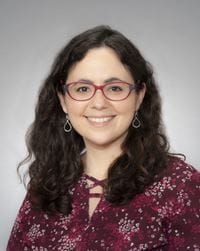Password Reset
Forgot your password? Enter the email address you used to create your account to initiate a password reset.
Forgot your password? Enter the email address you used to create your account to initiate a password reset.
0 Minutes
 Erica Braverman, MD, Instructor of Pediatrics in the Division of Pediatric Hematology/Oncology at UPMC Children's Hospital of Pittsburgh, was awarded a 2021 Hyundai Hope on Wheels Young Investigator Award.
Erica Braverman, MD, Instructor of Pediatrics in the Division of Pediatric Hematology/Oncology at UPMC Children's Hospital of Pittsburgh, was awarded a 2021 Hyundai Hope on Wheels Young Investigator Award.
The two-year, $200,000 award will support Dr. Braverman’s research proposal to investigate how upregulation of the AMP-activated protein kinase (AMPK) pathway may lead to improved, more durable responses in chimeric antigen receptor (CAR) T cell therapy for leukemia and other cancers.
Dr. Braverman’s research interests focus on cancer immunotherapy, specifically areas of investigation related to improving T cell function and metabolic fitness to better fight and destroy cancer cells.
Preliminary studies by Dr. Braverman have shown that upregulation of the AMPK pathway in T cells can make them more metabolically efficient. AMPK is an enzyme that functions as a cellular energy sensor and regulates specific metabolic pathways within activated cells. AMPK plays a number of roles in the metabolic choices of T cells, working to promote and enhance metabolic fitness to support function and survival.
“Cancer cells can be quite good at evading detection or suppressing T cell responses, or otherwise forcing T cells into making suboptimal metabolic choices. In certain solid tumors, the microenvironment is an inhospitable, nutrient-poor, oxygen-deprived realm in which T cells are tasked with functioning. Improving how T cells respond metabolically in the face of cancers, or finding ways to boost their responsiveness in such therapies as CAR T, offer promising avenues for new therapeutics and combinatory treatment approaches," says Dr. Braverman. "Our preliminary work suggests that upregulating the AMPK pathway in human T cells is a viable approach to improve T cell metabolism in the face of cancer. Now we are going to apply these findings to see if upregulating the AMPK pathway in CAR T cells can improve therapeutic responses."
Using a mouse model of B cell acute lymphoblastic leukemia, Dr. Braverman’s new grant will support the creation of AMPK upregulated CAR T cells and challenge them in leukemia models to learn more about the response and mechanisms of action.
“CAR T cell therapy has shown promise for some patients, but one of the challenges has been the durability of response, and this is in part related to issues of T cell metabolism," says Dr. Braverman. “If we can improve durability of CAR T cells, we may be able to not only improve response rates in certain leukemias, but also create a better understanding of how CAR T cell therapy may be applied to combat solid tumors, where this therapy has yet to show much efficacy."
Additionally, Dr. Braverman will work to more fully explore the role of AMPK within human T cells. Her research aims to better understand which pathways are being activated downstream of AMPK during T cell activation, and how these pathways affect T cell metabolism and function.
"This work has implications beyond just cancer immunotherapy and CAR T cell therapy. Understanding how to modulate the metabolic choices of immune cells has implications for virtually any disease state that has a component of immune dysregulation, including sepsis and autoimmune conditions. What we find could have a far-reaching impact beyond our cancer studies," says Dr. Braverman.
Erica Braverman, MD, is an Instructor of Pediatrics in the Division of Pediatric Hematology/Oncology at UPMC Children's. She earned her medical degree from Brown University and completed her residency training in combined Internal Medicine and Pediatrics at Strong Memorial Hospital at the University of Rochester Medical Center. During residency, Dr. Braverman joined the laboratory of Dr. Jessica Shand in the Division of Pediatric Oncology, where she studied the effects of leukemia-derived alarmin signals on T cell exhaustion.
Dr. Braverman's pediatric hematology/oncology fellowship was completed at UPMC Children's, where she conducted research and continues to be a member in the laboratory of Craig Byersdorfer, MD, PhD. During fellowship, and in the Byersdorfer Lab, Dr. Braverman began to study ways to improve CAR-T cell therapy through controlling underlying T cell metabolism.
Dr. Braverman was awarded numerous research and scholarship awards during her medical training. She was selected as a summer research fellow at Memorial Sloan Kettering Cancer Center between her first and second year of medical school. With a growing interest in cancer immunotherapy research, Dr. Braverman applied for and was selected to join the prestigious HHMI-NIH Research Scholars Program between her third and fourth years of medical school. She is a past recipient of the American Society of Hematology HONORS Next Generation Physician Scientist Award during her residency training. At UPMC Children's and the University of Pittsburgh, Dr. Braverman was funded through the Cancer Immunology Training Program T32, was named a Burrough's Wellcome Scholar, and also secured research funding through the prestigious UPMC Children's Scholar's Program.
Braverman EL, Waltz G, Byersdorfer CA. Immunometabolism in Haematopoietic Stem Cell Transplantation and Adoptive Cellular Therapies. Curr Opin Hematol. 2020; 27(6): 353–359.
Braverman EL, Byersdorfer CA. Increasing AMPK Activity Supports Enhanced Oxidative Metabolism, Proliferation, and In Vitro Recovery of Human CD4 T Cells [abstract]. In: J Immunol. 2020; 204 (1 Supplement): 240.2-240.2.